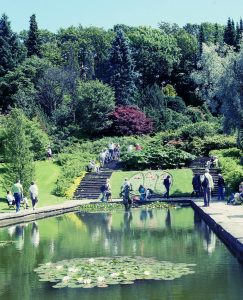Great science, great fun
Our vision is to be one of the most creative, productive and exciting research groups in evolutionary biology and biogeography. We're always looking for new, motivated people to join our group. Read on to find out more about our lab culture and our resources and to view current opportunities for PhD students, post-docs and masters projects.A lab group with a shared
vision
We are a diverse group of individuals from around the globe joined by our deep interest in the natural world. Our lab members are mostly based in Gothenburg (Sweden) and the Royal Botanic Gardens, Kew (UK), but we have many associated members based in institutions worldwide.
Regular lab meetings
We try to meet regularly in order to share information between ourselves and with other groups. We organise weekly breakfast meetings as well as two week-long group meetings twice a year in interesting locations. Additionally, we have fortnightly journal and software clubs.
Labs and computing
We have on-site labs for NGS nucleotide analysis with extensive in-house experience. We also have access to the two national genomic facilities, SciLifeLab and the Sahlgrenska Academy Core Facility. At Kew, there is a suite of laboratories covering biochemistry, in vitro biology, imaging, cytogenetics, molecular biology and seed biology, including the Millennium Seed Bank and associated labs. All our members have access to local and national computing servers for bioinformatic analysis.
Conferences, travel
and teaching
We are part of the Gothenburg Global Biodiversity Centre, Centre of Biodiversity and Ecosystem Services in a Changing Climate and the ForBio network. As a result our lab members, and in particular our students, have greater opportunities for funding, travel grants and learning resources.

Do you think you'd fit into our group?
- The natural world is important
- The natural world is incredible
- The natural world is our home
- I want to do the best science ........ but I also want to live well
Available positions
Exciting new position available as a postdoctoral researcher in biodiversity genomics Join us if you want to help understand and protect plants and fungi for the benefit of people and the future of all life on Earth. Based at the Royal Botanic Gardens, Kew in London.
Deadline: More detailshereMaster's projects are available! We are always open to Master's students joining the lab in Gothenburg and RBG Kew as part of their degree course. If you have an idea for a project or you would like to see what projects you can choose from, then do get in touch directly with the group member you would like to collaborate with. Please make sure you provide a short CV (or a brief description about yourself and your skills/experience), and your potential interests. We are unlikely to respond to shotgun-style emails.
Deadline:Collaborations welcome!Are you a researcher with funding looking to collaborate with the group? We are open to outside people coming and contributing to our lab. In the past we have opened our doors to PhD students and post-docs who have visited us for both long and short periods. Additionally, we have many collaborators based around the world who work alongside us on many research projects. Please get in touch directly with the group member you would like to collaborate with.
Deadline:We are based mainly in Gothenburg (Sweden) and the Royal Botanic Gardens, Kew (UK).
Gothenburg is Sweden’s second largest city. Notwithstanding the long and cold winters, Sweden is one of the world’s most successful societies, boasting high levels of economic prosperity and quality of life. Gothenburg is situated on Sweden’s west coast and has a population just over a million people. The sea, the coast and beaches are a short tram ride from the centre, as are extensive forest nature reserves and leisure areas.
The city and the University of Gothenburg offer a number of services and information to facilitate foreign researchers to move to the city and there are a number of activities to make new researchers feel at home. Additionally, the university may be able to offer accommodation to new, foreign researchers through its guest housing services. Our lab is located within Gothenburg’s botanic garden (photo credit Agnetagreen).
The Royal Botanic Gardens, Kew is at the forefront of plant and fungal science, as well as being a UNESCO World Heritage Site and a major visitor attraction. Kew also houses the largest and most diverse botanical and mycological collections in the world, with over 8.5 million items representing approximately 95% of vascular plant genera and 60% of fungal genera. Kew scientists have access to these unrivalled collections, along with state-of-the-art laboratory facilities and a network of over 400 collaborating institutions worldwide. Based on the edge of London, Kew benefits from being part of a hub of biodiversity institutions and universities in a vibrant city.

